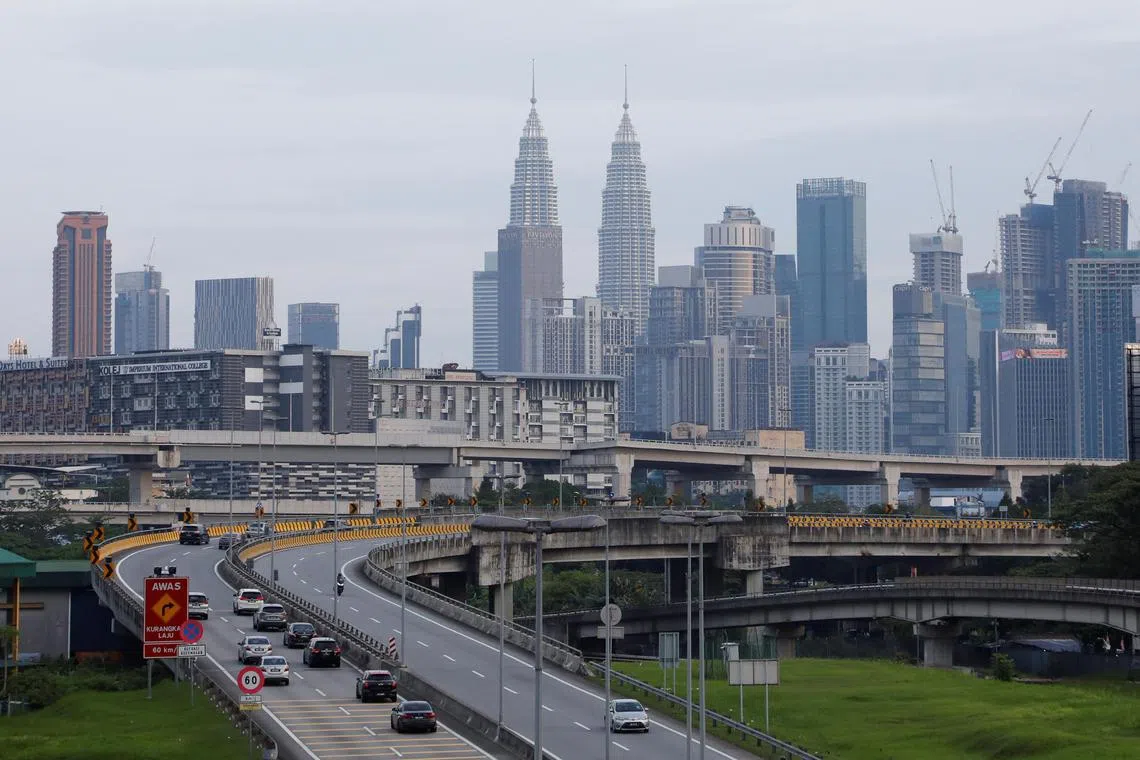Malaysia’s 5G rollout still in limbo despite PM Anwar’s new deadline
Sign up now: Get insights on the biggest stories in Malaysia

Malaysian PM Anwar Ibrahim on Friday brought forward the deadline for 80 per cent 5G coverage by a year to end-2023.
PHOTO: REUTERS
KUALA LUMPUR – The fate of Malaysia’s much-delayed 5G mobile network is still up in the air despite it already being rolled out to half the country’s populated areas and Prime Minister Anwar Ibrahim on Friday bringing forward the deadline for 80 per cent coverage by a year to end-2023.
Industry players are still split over whether to stick to the Single Wholesale Network (SWN) model under state-controlled Digital Nasional Berhad (DNB) or to launch a second provider for the data service that is crucial to driving high-technology applications worth billions to the economy.
DNB’s establishment was fiercely criticised by Datuk Seri Anwar and Digital Communications Minister Fahmi Fadzil when they were in the opposition.
Official sources told The Straits Times that Mr Fahmi’s hurried meeting on Saturday with stakeholders after Mr Anwar’s Budget speech on Friday failed to yield any concrete plans on how to achieve the accelerated timeline of 80 per cent coverage of populated areas while keeping consumer prices low.
The 80 per cent target is the metric used to measure full nationwide availability in all major towns, with much slower progress expected in the more remote areas.
Halving the time needed to reach nationwide coverage will require additional financing and likely mean higher costs.
Mr Fahmi has also refused to delay the end-March deadline to complete a review of the RM16.5 billion (S$4.9 billion) rollout of the super-fast network, which means there is less than a month to complete a Cabinet paper for a final decision.
“The minister clarified that PM’s speech did not mean that the existing SWN structure will be retained. All options appear to still be on the table, including a Dual Wholesale Network (DWN),” said an industry source with knowledge of the meeting.
In his Budget 2023 speech, Mr Anwar, who is also finance minister, acknowledged that DNB had reached 50 per cent of populated areas at the end of 2022 – a claim disputed by Mr Fahmi in January – and set the new coverage target “at an affordable price”.
“The unity government now takes the approach that DNB is managed with more transparency and inclusiveness to achieve full participation by service providers,” Mr Anwar said.
On Sunday, Mr Fahmi told reporters that discussions with telecommunications companies were ongoing “on whether we continue with a SWN or not and the relationship between DNB and telcos”.
Efforts to launch the new mobile Internet service had been ongoing since Mr Anwar’s Pakatan Harapan came to power in 2018 under Tun Dr Mahathir Mohamad’s premiership.
It had then mooted an SWN led by a consortium of mobile network operators (MNOs), but despite their agreement, little progress had been made by the time Parti Pribumi Bersatu Malaysia president Muhyiddin Yassin led his party out of PH and took power in March 2020.
DNB was established two years ago by then Premier Muhyiddin, who now leads the opposition Perikatan Nasional (PN) pact, in a bid to catch up with regional peers like Singapore, Thailand, Indonesia and the Philippines in offering the technology.
But the implementation was repeatedly delayed as telcos and politicians like Mr Anwar and Mr Fahmi pushed back, claiming a lack of transparency and unfair pricing. The then government had insisted that the use of a state-run SWN would drastically reduce the cost of mobile data from the existing 4G system.
Maxis and U Mobile – which together control about 40 per cent of the market – have led other MNOs in lobbying for a DWN regime, in part so that they can have a say in how the 5G infrastructure is rolled out.
This resulted in a review which led to the government deciding a year ago to open up equity in DNB to private operators so they can protect their interests.
YTL Communications and state-controlled Telekom Malaysia (TM) have agreed to a 20 per cent stake each in DNB, while DiGi and Celcom have 12.5 per cent each ahead of their impending merger, although agreements have yet to be inked.
While U Mobile – whose largest stakeholder is Singapore investment company Temasek, and with notable figures such as Berjaya Group magnate Vincent Tan and Sultan Ibrahim Iskandar of Johor having a stake in the company – did not take up a stake, it agreed to buy 5G capacity.
This leaves Maxis, controlled by tycoon Ananda Krishnan, as the only major MNO not offering 5G coverage. It maintains, like the Anwar government, that there are transparency and governance issues with DNB.
But ST has learnt that under the latest 5G review – part of a wide swathe of probes and cancellations of Muhyiddin era deals – various proposals to either take over the 5G rollout or build a second network have been mooted, including by sovereign wealth fund Khazanah via TM, of which it is the largest shareholder.
The future management of DNB is also in doubt, with current chief executive Ralph Marshall’s contract expiring in a fortnight. Sources say that as at last week, there has been no word of a renewal.
The uncertainty weighs on the rollout of the infrastructure which had been going ahead of schedule in the past year. A competing network would undermine DNB’s revenue forecasts and impact its financing deals with banks.
Previous governments have said before these delays that RM650 billion in economic value and 750,000 jobs would be created by 2030 from the use of 5G.



